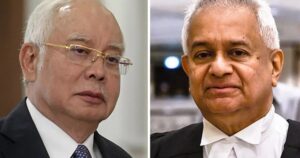
The past few weeks have presented a picture of private primary care practitioners (or GPs) in Malaysia coming under tremendous pressure. In fact, more than a few in the fraternity have likened it to being “under siege”.
First, the long-awaited increase in consultation fees, an issue that has been going on for more than three decades, was again shelved by the Cabinet based on recommendations from the National Action Council on Cost of Living (Naccol).
Second, Naccol had, a few days ago, via an announcement by the deputy domestic trade and cost of living minister Fuziah Salleh, mandated that GPs must issue prescriptions for every consultation as well as provide itemised billing.
Third, in a separate statement issued recently, Fuziah promised that the updated guidelines for the beauty industry will be out in a short time.
These new guidelines promised to allow beauty salon operators to expand services, possibly through the use of certain equipment such as lasers or high intensity focused ultrasound (HIFU) – which are traditionally regulated for use in aesthetic medical centres manned by medical professionals currently.
These actions are coming out of the most basic economic textbook:
i) cost control from the supply side i.e. limit the consultation rates of GPs so that prices remain “low” for patients; and
ii) allow alternative sources of supply i.e. diversify supply of medicines by allowing patients to buy medicines or obtain health services from other possibly “cheaper” sources.
Underlying all this is the philosophical premise that GPs are being treated as a “public good” – an economic term that refers to a service that every member of society can consume freely without reducing its availability to others.
The two main criteria that distinguish a goods or service as being a “public good” is that it must be non-rivalrous and non-excludable.
The term non-rivalrous means that the supply of the service must be continuous and not reduced even as it is being consumed; while the term non-excludable means that the service is available to all citizens.
GP services have often been presented as a “public good” in Malaysia.
But are they, really? On the surface it may seem to be true, after all, as one of the parallel arms providing primary care services across the country, in many locales they offer round-the-clock service which are open to all recipients who need health services.
However, it must be reminded that GP services are not provided for free. Their services need to be paid for by the user; and this takes it away from the concept of them being a “public good”.
A key premise of a “public good” is that it is often provided at highly subsidised prices or even at no cost to the consumer — with public taxation taking on the burden of funding it. GP services are not, and thus they are actually a “market good” where willing buyers partake of the services offered and pay for it.
Here is where the disconnect lies. GPs are a key player within the Malaysian health landscape. A significant number of citizens (around 34% to be exact) and non-citizens visit GPs to obtain primary care services, and pay for them. This is despite the public healthcare system having public primary care clinics (klinik kesihatan) in which citizens pay RM1 only for services.
It has also been clearly documented in many instances that GP clinics play a clear role in assisting decongestion and overcrowding at public primary care clinics.
Ironically, even amidst the recent controversy around the rise in insurance premiums and health inflation, all parties unequivocally pointed to primary care services as the only sustainable solution to mitigate the rise in health expenditures. Viewed through this lens, GPs may then be considered to be a “public good”.
Unfortunately, GPs are businesses. Additionally, they are businesses that are not subsidised by the government. Naccol and agencies such as the domestic trade and cost of living ministry are trying to make GPs function as a “public good”; forgetting the seminal rule that a “public good” needs to be subsidised so that they can be provided at low-or-little cost to consumers.
You cannot continue to argue that the prices of GP consultations will have an impact on the national cost of living when you are already providing subsidised public primary care services for which consumers are only required to pay RM1.
It’s a highly flawed piece of logic. The indecision comes from the attempt to treat GPs as “public good”, without the mechanism to either fund their service provision or to allow them to be treated as a “market good”, enabling and allow them to function in a free-market environment.
In the spirit of cost control as well, it is clear the Naccol and agencies such as the domestic trade and cost of living ministry are attempting to introduce competition within the primary care landscape – whereby other non-medical professionals can also provide some services similar to that being provided by GPs as a cheaper alternative.
This is, again, something which may be attempted in a “knee-jerk” manner.
The healthcare landscape is highly regulated. There is a reason for this. Time and again, poorly regulated non-health professional players all over the world are allowed entry into the sector and end up costing money, time and lives.
The most recent issue around the manipulation and misuse of teleconsultation services in our southern neighbour clearly exemplifies this.
What most people also don’t realise is that compliance with such extensive regulations are expensive. And these costs have to be transferred to the customer. Within the private healthcare sector in Malaysia extensive regulation provides quality and safety of care, but it also adds costs to the total bill to be paid by the customer.
Current attempts to allow other non-healthcare players to enter the healthcare space of service provision, and through this create healthy competition which may drive down costs to consumers is highly welcome; provided they too are subject to the same regulations that are imposed for healthcare professionals.
This is an ongoing battle, and six years ago, I covered these aspects in a column.
Nothing seems to have changed though. The issue really is quite straight forward.
If GPs are a “public good”, the government should be assisting them in providing a much-needed service which complements the public health system in this country.
If not, then allow GPs to provide their services in a free-market environment, provided all players are on a level playing field, unhampered.
The government really needs to decide if GPs can be considered a “public good” or not.
The views expressed are those of the writer and do not necessarily reflect those of FMT.






